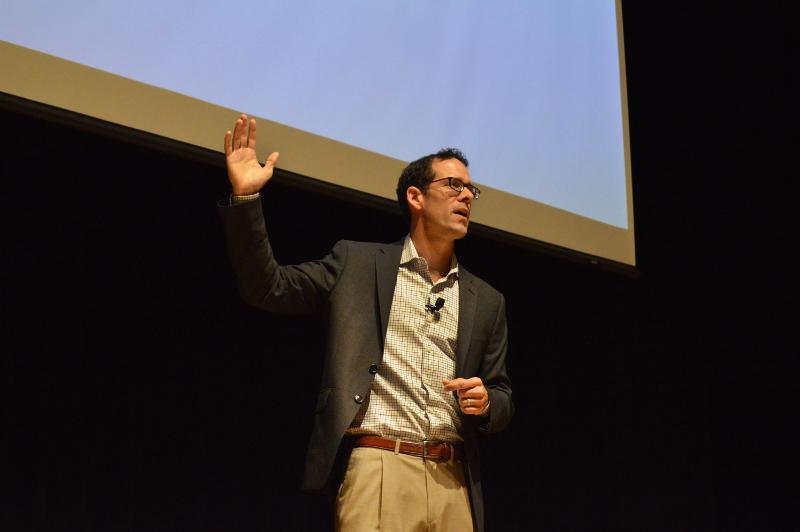This Thursday, Academy Award-nominated actor Jonah Hill came to Marquette’s campus to speak about baseball analytics, sabermetrics and his current goal to lead the woeful Cleveland Browns to their first Super Bowl in franchise history.
Wait, sorry for the confusion. The actual speaker was Paul DePodesta, the chief strategist for the Browns. But most know him as the Oakland Athletics’ assistant General Manager — Jonah Hill’s character — in “Moneyball,” the Academy Award-nominated film starring Brad Pitt.
DePodesta was brought in as part of the Kellstadt Speaker Series, hosted by Marquette’s Marketing Department, and spoke in Weasler Auditorium.
“We thought he would be outstanding on analytics,” Craig Andrews, a professor and the organizer of the event, said. “This talk had a tremendous impact, especially the message of not using heuristics and what you know to evaluate different situations.”
Andrews, a Browns fan for 61 years, had the idea of bringing DePodesta brought up to him by his dean, Brian Till. His immediate response was “done deal.”
When DePodesta emerged from backstage, one thing was immediately clear: he looks nothing like Jonah Hill. Or, as DePodesta comically quipped, Hill looks nothing like him.
“People sometimes forget that,” he said.
The topic of the discussion was his method to achieving success by looking at traditional business practices in a fresh way and asking the seemingly obvious but often overlooked questions in an effort to achieve unprecedented heights in situations labeled as hopeless.
It all starts with a top secret booklet DePodesta likes to call his decision guide.
“We started writing down every decision in the moment we had to make those decisions. What were the pros and cons, what were the other options at the time, what were the chances it would work out, etc.,” DePodesta said. “We found we were terrible at recalling all the specific circumstances back when we made a decision. Especially confidence level.”
It’s simple, borderline boring, and surely not the “Chamber of Secrets”-level discovery the room full of sports fans, analytics enthusiasts and casual observers on the edge of their seats was looking for. But, DePodesta’s strategy isn’t about reinventing the wheel. It’s looking at the wheel from a view nobody has seen before.
His method is something he calls asking the naive question.
“If we weren’t already doing it this way, is this the way we would start?” he said.
While it might seem unnecessary for an individual with almost 20 years in the front office to ask simple questions, DePodesta readily admits his own naivete.
When DePodesta first started out in the Cleveland Indians organization, he was a van driver, and that was the last time he thought he understood baseball. During his childhood, he played, kept stats and had a general following of the game, but quickly realized there were so many more levels than he realized.
He also realized, through an epiphany at a casino, there was a market inefficiency in the way teams were evaluating baseball players. Just because teams were having success didn’t mean they were doing it right. It was a gambling fallacy.
“We took everything we thought we knew about baseball and threw them out the window,” he said. “A large percentage of players were completely fungible and could be replaced with much cheaper players. … Traditional statistics didn’t tell the whole truth, and sometimes, they were downright misleading.”
“Our job is to make predictions under complete uncertainty,” he said.
Wrapping up his lecture, DePodesta gave one more piece of lasting advice: “If you don’t leave here with anything else today, make sure you remember this: Root for the Browns.”
Afterward, DePodesta was available to answer some questions from the audience, and they was almost more ruthless than the press in their pursuit for information.
The third question of the day addressed the multi-million dollar elephant in the room, Brock Osweiler, and DePodesta’s plan for the young, embattled quarterback moving forward.
DePodesta didn’t give any substantial new information, only affirming the value they saw in the second-round pick and remaining non-committal to Osweiler’s status as a potential starter by calling him nothing more than a “lottery ticket” who “had success in the past.” He still gave an excellent explanation of the NFL cap situation and summarized some of the conversations that went down between two of the front offices during negotiations.
The final question he took was focused on Carson Wentz and trading away the second overall pick in the 2016 draft. Briefly, he explained Wentz was an excellent quarterback who checked all the boxes, but the Browns were so devoid of talent that bringing him on wouldn’t have been beneficial to him or the team, regardless of his skill level.

